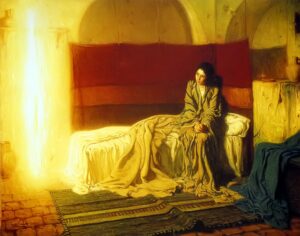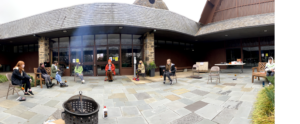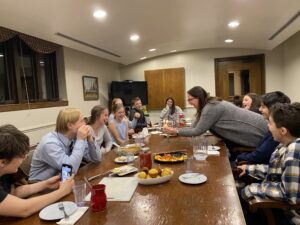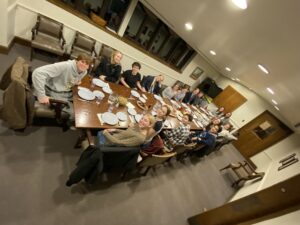Last Sunday a dozen newcomers gathered around three tables in our parish hall, reflecting on what drew them to Redeemer.
“The vibrant community,” one offered.
“There’s a warmth,” another observed.
“I’ve been church shopping and I really like it here,” shared a third, echoed by others.
The ages of those gathered ranged from early-thirties to seventy-something. Two credited their children — one, a senior in high school; the other, in elementary school — for leading them here.
Some have found their way back to church after a long hiatus. Two had driven by Redeemer for years and years before only recently deciding to turn off Charles onto Melrose and into our parking lot, to come through our doors. One has lived all around the world and experienced different faith traditions; having just moved to Baltimore, she knew she needed to find an Episcopal Church, and she, like the others, has chosen Redeemer.
I remember the first time I stepped foot inside an Episcopal Church. Having grown up Roman Catholic, going to church every Sunday was a rhythm to which I was accustomed. But somewhere in my twenties, I had already begun feeling a disconnect with the church of my childhood without having found an alternative. Finding the Episcopal Church in my early thirties felt like coming home to a space that I didn’t even know I was longing for, until I arrived. Being ministered to by a woman priest, who was also a wife and a mother? Being invited to communion, regardless of where I was on my journey of faith? Feeling affirmed and supported in my own questioning, wondering and searching? Staying all the way through to the end of the service, to enjoy singing the very last hymn all together, and not rushing out immediately right after communion?
“Toto, we’re definitely not in Kansas anymore” is a bit like what it all felt like to me as a newcomer, twenty-two years ago.
As I have come to know and fall in love with our Redeemer community since joining our staff 13 years ago, I have come to understand the depth and breadth of what people carry in their hearts, especially that which is heavy to carry: the responsibility of leading a family, a team, an institution; the angst of navigating your way from adolescence to adulthood; the challenges of being new parents; feelings of isolation and loneliness, grief and despair; the mixed blessings of becoming “empty nesters”; overwhelm at trying to both raise children and take care of aging parents; the wilderness of living life without a partner or spouse; the anxiety of an unexpected illness; the onset of “the winter” of our lives …
Added to this the weight of the world and the suffering of fellow humans in our city, nation, and around the globe; “the nightmare” instead of “the dream” that God envisions for us all, as technology makes it possible for each of us to watch brutality and horror on screens and cell phones that no human should ever have to see, much less experience and die from. And then, of course, there is the crying out of our very Earth, our “island-home”.
So we come to Redeemer cry …
We come to Redeemer to pray …
We come to Redeemer for a word of encouragement, of hope, of comfort …
We come to Redeemer to not feel so alone …
We come to Redeemer to sing …
We come to Redeemer to be fed, to be stretched, to learn, to grow …
We come to Redeemer to fill up our tanks, so the light inside us can burn just a little bit brighter, or perhaps be kindled again after having burned out, so we can bear light and be light, out in the world beyond the walls of 5603 N Charles Street …
We come to Redeemer to feel solid ground beneath our feet …
We come to Redeemer to connect …
We come to Redeemer to breathe …
We come to Redeemer to serve …
We come to Redeemer to engage with our neighbors in our city, to build One Baltimore …
We come …
What about you? What of the above resonates with you? Why do you come to Redeemer?
I am so glad and grateful that you are here, and would like to offer some words of encouragement by way of our Jewish brothers and sisters (with thanks to a friend, for emailing this to me):
“Do not be daunted
by the enormity of the world’s grief.
Do justly, now.
Love mercy, now.
Walk humbly now.
You are not obligated to complete the work,
but neither are you free to abandon it.”
(The above quote is often attributed to the Talmud, but is more accurately described as a loose translation of commentary on a portion of the Pirke Avot, which is itself a commentary on Micah 6:8. See Wisdom of the Jewish Sages: A Modern Reading of Pirke Avot by Rabbi Rami Shapiro.)
Love,
Cristina
This week, we kick off a new season of stewardship. Please keep an eye out for your pledge form in the mail and prayerfully reflect on what financial amount you/your household can pledge to invest in Redeemer this year, so we can continue to grow, thrive and serve together as a community of faith and bearers of Christ-light in our families, communities and city. No investment is too large or too small, and the return on your investment is immeasurable. Email Ellen Chatard if you have any questions.



